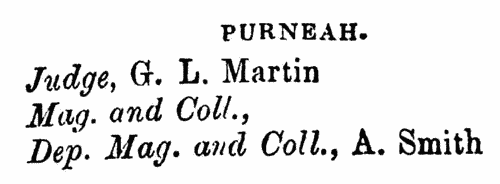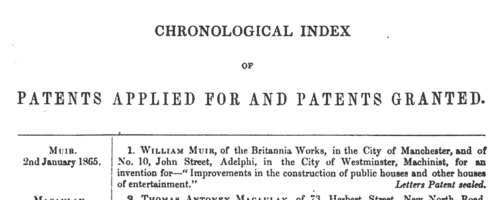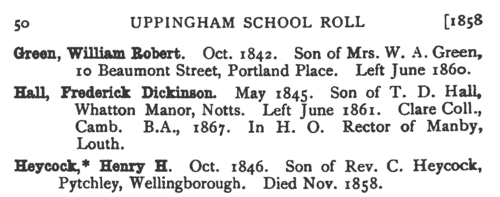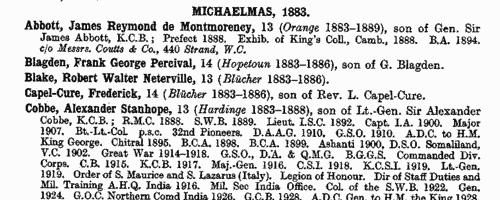Maude Surname Ancestry ResultsOur indexes 1000-1999 include entries for the spelling 'maude'. In the period you have requested, we have the following 411 records (displaying 271 to 280): Single Surname Subscription | | | Buying all 411 results of this search individually would cost £2,132.00. But you can have free access to all 411 records for a year, to view, to save and print, for £100. Save £2,032.00. More... |
These sample scans are from the original record. You will get scans of the full pages or articles where the surname you searched for has been found. Your web browser may prevent the sample windows from opening; in this case please change your browser settings to allow pop-up windows from this site. British officers and civil servants in India
(1861)
The Indian Army and Civil Service List for July 1861 was printed by order of the Secretary of State for India in Council. Dating from after the reform of British rule in India in 1858, the one volume brings together lists of British military officers and civil officials. The regimental lists for the army in the three presidencies (Bengal, Madras and Bombay) are arranged as in any Army List of the period, giving officers by rank, with date of rank in the regiment and the army, and remarks. The native regiments had been reorganised and reduced from 174,237 of all ranks on 1 January 1859 to about 110,400 men in 1861. There are summary lists of all the native military, giving for each the names and dates of appointment of the British commandant, second-in-command, adjutant and medical charge - the Agra Levy, Alexander's Horse, Allahabad Levy, Allygurh Levy, Arracan Battalion, Assam Light Infantry, Bareilly Levy, Belooch Regiments, Benares Horse, Candeish Bheel Corps, Cawnpore Levy, Cutch Legion, Deolee Irregular Force, East Indian Regiment, Erinpoora Irregular Force, Extra Goorkha Regiment, Fane's Horse, Ferozepore Regiment, Futtehgurh Levy, Ghaut Police Corps, Guide Corps, Guzerat Bheel Corps, Guzerat Cooly Police Corps, Guzerat Irregular Horse, Guzerat Police Corps, Guzerat Provincial Battalion, Gwalior Camel Corps, Gwalior Infantry, Hazara Goorka Battalion, Hill Rangers, Hodson's Horse, Hyderabad Contingent, Jacob's Rifles, Kamroop Regiment, Kemaoon Battalion, Kemaoon Levy, Khelat-i-Ghilzie Regiment, Kolapore Infantry, Lahore Horse, Lucknow Regiment, Loodianah Regiment, Mahratta Horse, Malwa Bheel Corps, Meade's Horse, Meerut Levy, Meywar Bheel Corps, Mhair Regiment, Mhairwarrah Battalion, Mooltanee Cavalry, Moradabad Levy, Murray's Jhat Horse, Mynpoorie Levy, Nagpore Irregular Force, Nusseree Battalion, Patan Cavalry, Pegu Light Infantry Battalion, Ramgurh Irregular Cavalry, Poona Horse, Poorbeah Regiment, Punjab Cavalry, Punjab Infantry, Punjab Irregulars, Robarts's Horse, Rohilcund Horse, Rutnagherry Rangers, Sattara Local Corps, Sawunt Waree Local Corps, Scinde Horse, Sebundy Sappers and Miners, Seikh Infantry, Seikh Irregulars, Shahjehanpore Levy, Shekhawatee Battalion, Sirmoor Rifles, and Sylhet Light Infantry. European civil servants are listed from the Accountant-General's Office, Audit Department, Civil Service, Government Offices, Judge Advocate-General's Department, Public Works Departments and Surveyor-General's Department; and there are clergy, law and medical lists. MAUDE. Cost: £4.00.  | Sample scan, click to enlarge

| Long-stay Paupers in Workhouses: Salford
(1861)
This comprehensive return by the Poor Law Board for England and Wales in July 1861 revealed that of the 67,800 paupers aged 16 or over, exclusive of vagrants, then in the Board's workhouses, 14,216 (6,569 men, 7,647 women) had been inmates for a continuous period of five years and upwards. The return lists all these long-stay inmates from each of the 626 workhouses that had been existence for five years and more, giving full name; the amount of time that each had been in the workhouse (years and months); the reason assigned why the pauper in each case was unable to sustain himself or herself; and whether or not the pauper had been brought up in a district or workhouse school (very few had). The commonest reasons given for this long stay in the workhouse were: old age and infirm (3,331); infirm (2,565); idiot (1,565); weak mind (1,026); imbecile (997); and illness (493). MAUDE. Cost: £6.00.  | Sample scan, click to enlarge

| Members of Durham University and Newcastle College of Medicine
(1861)
This alphabetical list of members of the University of Durham and of the College of Medicine, Newcastle, gives full names; those marked with an asterisk being Members of Convocation; those marked with a dagger being either fellows or late fellows of the university. On the righthand side is a column of dates. In the case of graduates this is the year in which the examination for the degree of B. A. was passed; and in the case of Licentiates in Theology, and of Civil Engineers, to the year in which each passed the final examination. Those dates that are marked with a double dagger are years in which the graduate, being a member of another university, passed the final examination in theology at Durham. The centre column gives the degree and, where appropriate, college. MAUDE. Cost: £4.00.  | Sample scan, click to enlarge

| Members of the Royal Agricultural Society of England
(1861)
The list of members of the Royal Agricultural Society gives names and addresses: life members are indicated by a dagger. (The names of 60 members were omitted on account of their subscriptions to the society being in arrear to 31 December 1859). This list is correct to June 1861; as of 11 December of that year there were 84 life governors, 95 annual governors, 1124 life members, 3399 annual members and 17 honorary members, making a total of 4719 names, mostly of landowners and agriculturists.MAUDE. Cost: £4.00.  | Sample scan, click to enlarge

| Deaths, Marriages, News and Promotions
(1862)
Death notices and obituaries, marriage and birth notices, civil and military promotions, clerical preferments and domestic occurrences, as reported in the Gentleman's Magazine. Mostly from England and Wales, but items from Ireland, Scotland and abroad. July to December 1862MAUDE. Cost: £4.00.  | Sample scan, click to enlarge

| Patentees of New Inventions
(1864)
Abstracts of British patents for new inventions applied for and granted from 1 January to 31 December 1864: giving date, name and address, and short description of the invention. It is then stated whether 'Letters patent sealed' or 'Provisional protection only'.MAUDE. Cost: £6.00.  | Sample scan, click to enlarge

| East Kent Registered Electors: Ashford
(1865)
The poll for two knights of the shire to represent the Eastern Division of the county of Kent in parliament was taken 18 July 1865, the candidates being Sir Edward Cholmeley Dering, bart., (D), Sir Brook William Bridges, bart., (B), and Sir Norton Joseph Knatchbull, bart., (K). This poll book lists all registered electors, whether they voted or not, by electoral district (Ashford, Canterbury, Dover, Faversham, Hythe, Margate, Ramsgate, Romney, Sandwich, Sheerness, Sittingbourne, Whitstable and Wingham) and then by township or parish within which lay the property whereby the electors had qualified. The lefthand column gives sequential number in the whole volume; then follows the elector's full name, surname first, and his address (often elsewhere); and on the righthand side for whom he voted. When the elector was qualified in duplicate the vote is recorded opposite to the number upon which he claimed to vote at the polling booth, and wherever his name occurs elsewhere a reference is made, immediately after the address, to the number where his vote is recorded, with the initials of the candidates for whom he voted. Duplicate voters who were dead at the time of the election, or did not vote, are printed in italics to signify that they did not vote, or are stated to be dead once only; and wherever the names of such electors occur elsewhere references are made to the numbers where alone they are reckoned in the abstract of the poll as dead or not voting. Whenever a number only, without any other reference, follows the address, it denotes that at the number referred to, the elector is entered as not voting. MAUDE. Cost: £6.00.  | Sample scan, click to enlarge

| Patentees of New Inventions
(1865)
Abstracts of British patents for new inventions applied for and granted from 1 January to 31 December 1865: giving date, name and address, and short description of the invention. It is then stated whether 'Letters patent sealed' or 'Provisional protection only'.MAUDE. Cost: £6.00.  | Sample scan, click to enlarge

| Boys entering Uppingham School
(1866)
The public school at Uppingham in Rutland was founded by Archdeacon Johnson in 1584. A roll of scholars from 1824 to 1905 was edited by J. P. Graham, and published in 1906. This was a revision and updating of an 1894 edition of the roll, the great bulk of the work having been done by Mrs Mullins. The roll is arranged by year, and within each year by term of entrance, and then alphabetically by surname within each term. Each boy's name is given, surname first, with an asterisk where known (in 1906) to have died. Then there is month and year of birth, father's name (most often just surname and initials) and address (at entrance). Where the boy represented the school at Rugby football (XV) or cricket (XI), that is indicated. After the month and year of leaving the school, there is a brief summary of achievements in later life, and, where known, address as in 1906. MAUDE. Cost: £4.00.  | Sample scan, click to enlarge

| Boys entering Wellington College in Berkshire
(1867)
Wellington College, near Wokingham, was originally founded for the education of sons of military officers. A register of boys entering the school from First Term 1859 to Michaelmas 1933 was compiled by F. G. Lawrence for the Old Wellingtonian Society. In each entry the boy's name is given in full, in bold, surname first; age at entry (usually 11 to 14); then, in brackets, the name of the dormitory or house to which he belonged, in italics, with the years of his stay; then his father's name (usually surname and initials, but not christian name) with military decorations where appropriate. School prefects and captains are noted as such; if the boy played cricket for the school, XI with the years; academic honours, scholarships, &c.; a brief biography; and date of death, or (where known) address in 1933. Year of marriage is given, and sometimes the wife's name and/or her father's name. Clearly, those boys who kept contact with the school and/or had distinguished military careers have detailed entries; others disappeared into oblivion on leaving.MAUDE. Cost: £6.00.  | Sample scan, click to enlarge

|
Research your ancestry, family history, genealogy and one-name study by direct access to original records and archives indexed by surname.
|












